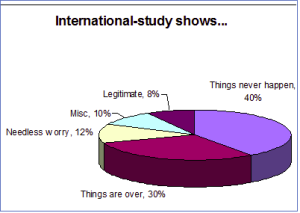
Contents
Why do we get stressed?
Today I will speak about stress and its management. As we know everybody has some stress and its quantum may vary from mild to severe. Major sources of stress are worries, irritation, anger, ego and jealousy and our perceived failure. Generally, opposition to what we wish, want and think generates anger and irritation. A justified opposition should not anger us but when reason is lost, ego comes in. Jealousy also feeds anger. Stress is associated with higher risk of heart attack, increase in BP, musculoskeletal aches, GIT disturbances, ulcer, asthma etc.
Very often lack of information and sheer misinformation can cause worry. The trick is never worry alone! When you feel worried, pick up the phone, walk over to the next room, find a friend, colleague, spouse and talk and get the facts right. According to a survey on worries, 40% worries are about things which never happen, 30% of worries are about things that are over, 12% are needless health worries, 10% are miscellaneous and small and only 8% are legitimate worries.. However little worrying can be constructive if it help you to work out solution to a problem.
Countering Stress
- Be receptive to criticism.
- Have a democratic attitude towards others’ views.
- Generosity is the antidote to jealousy.
- Practice gratitude and appreciation.
- Think positively.
- Forgive yourself and others.
- Allow yourself to receive love unconditionally from others.
- Give love from your heart unconditionally to yourself and others.
- Take constructive steps and make plans to combat problems.
The Slow Movement advocates a cultural shift toward slowing down life’s pace, and enjoying living, rather than rushing through life. Fast paced life is not heart-friendly; hurry leads to stress which increases cortisol in the body and puts one at an increased risk of heart disease. As Gandhiji once said, “There is more to life than increasing its speed”. When you slow down long enough to actually think, you make smarter decisions that lead to better outcomes thereby saves your time in long run.
Meditation
Meditation can be helpful in well-being and emotional balance. As per study in the US, African-Americans with heart disease practicing transcendental-meditation regularly were 48 % less likely to have a heart attack, stroke or die from all causes compared with those who attended health education class over 5 years. Similarly, mindfulness meditation which stresses attention to the present has proven to be useful for chronic pain. Meditation exerts a calming effect on body & mind, neutralizing stress and balances brain-wave patterns.- Sit comfortably in a quiet place in cross-legged & upright position
- Close your eyes, breathe deep & slowly
- Focus your attention on any object
- When your mind wanders, return your attention to the object it will become easier with practice, so persevere.
- Start with 2-3 min & increase up to 20 minute a day
- The Mantra “OM” can be chanted in the same posture. Bring the mind inwards and concentrate on the sound and the word. The chant is to minimize anger; repeat it over and over.

It pays to relax
Living under high stress has become the order of the day. Competition has developed in business, social, professional and educational world. In consequence, almost every individual is forced to meet demands on his nervous energy which leave him tired to the bone, tense and distraught. Many housewives get so tired and bored by evening that they cannot be pleasant companions to their husbands. Edgy nerves produce edgy reactions, which lead to much misery. Suggestions to lower the tension of Day-to-Day living.- Dispense with the notion that time devoted to rest is a sheer waste and don’t think that you are made of steel stuff.
- Select proper time to rest.
- If you are engaged in strenuous activity all through the day, spread your rest all over during the period, i.e. few minute spells, every two hours.
- Try breaking the habit of carrying on the day’s activities late into the night.
- Economize your energy by organizing your daily life.
- Do not fritter away energy on minor details/issue.
- Do not enter into useless arguments that workup your nerves
Techniques of Deep Relaxation
- Choose a quiet corner and relax in an easy chair, close your eyes to cut off the sensations from your surrounding world.
- Repeat these words slowly to act like instructions to your mind “I am going to relax deeply. I begin with my hands; my hands are becoming limp & heavy; they are getting heavier and heavier.”
- Let your hands become limp as if they were soaked leaves hanging loosely from the branch of a tree.
- Lift each of your arms in turn and drop them as if they are lifeless.
- Let go of every tense muscle.
- Go on relaxing every part of your body.
- You feel more and more peaceful.